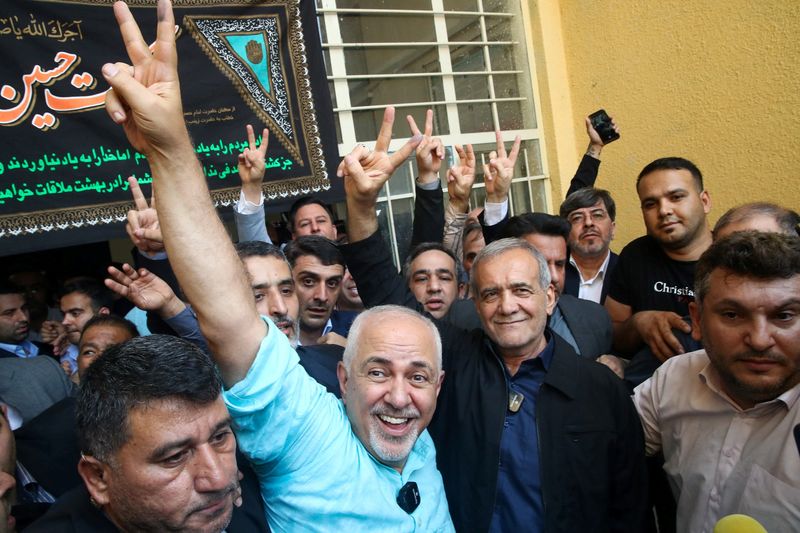Parisa Hafezi
DUBAI (Reuters) – Relatively moderate Masoud Pezeshkian urged people on Saturday to stand with him on the “difficult road” after winning Iran’s presidential election over hardline rivals.
Friday’s runoff vote is between moderate Pezeshkian, the only moderate among the original four candidates, and hardline former nuclear negotiator Saeed Jalili.
Pezeshkian, a 69-year-old heart surgeon, pledged to pursue a pragmatic foreign policy, easing tensions over currently stalled negotiations with major powers to restart talks on the 2015 nuclear deal, and improving prospects for social liberalization and political pluralism.
However, many Iranians are skeptical of his ability to fulfill his campaign promises because Supreme Leader Ayatollah Ali Khamenei, not the president, is the ultimate authority in the Islamic Republic.
Pezeshkian posted on social media: “Dear Iranian people, the election is over and this is just the beginning of our joint efforts. The road ahead is difficult. Only with your cooperation, sympathy and trust can everything go smoothly.” PlatformX.
“I extend my hand to you and swear on my honor that I will not abandon you on this path. Do not abandon me.”
Turnout for Friday’s vote was nearly 50%, following record low turnout for the first round of voting on June 28, when more than 60% of Iranian voters abstained from voting. The election was held after President Ebrahim Raisi died in a helicopter crash in May.
Pezeshkian has managed to win over an electorate whose core is believed to be largely the urban middle class and young people, widely disillusioned by years of security crackdowns that suppressed any public dissent to Islamic orthodoxy.
Videos on social media showed his supporters dancing in the streets of many towns across the country and motorists honking their car horns to cheer his victory.
foreign policy
Pezeshkian’s victory has fueled hopes of a thaw in relations between Iran and the West, which could create opportunities to defuse Iran’s nuclear dispute with world powers.
The election coincides with rising regional tensions due to conflicts between Israel and Iran’s allies Hamas in Gaza and Lebanon’s Hezbollah, as well as increased Western pressure on Iran over its rapidly advancing nuclear program.
Under Iran’s dual system of clerical and republican rule, the president has been unable to bring about any major policy shifts on Iran’s nuclear program or support for Middle Eastern militias because Khamenei calls the shots on the country’s highest affairs.

However, the president can influence the tone of Iran policy and he will be closely involved in selecting the 85-year-old Khamenei’s successor.
Pezeshkian is supported by the Iranian reformist camp led by former President Khatami. He is loyal to Iran’s theocratic rule and has no intention of confronting powerful security hawks and clerical rulers.

